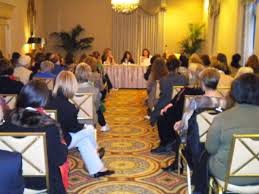How to Prepare for a Writing Conference
TWO QUESTIONS YOU NEED TO ANSWER FIRST
If the answer is no to either question, you should definitely not attend (**with one exception below).
- Are you ready? That is, do you have a draft of the manuscript that is ready to go? When you attend a conference it is highly likely that someone will ask to see it, so you need to have it ready to send immediately.
- Are you sure you signed up for the right conference?
It should be about the same genre you are writing in (mystery writers’ for mysteries, romance writers’ for romance, etc.). It should have presenters and workshop leaders you like or are interested in. And it should be legitimate. (It’s simple enough to check to see how long it’s been around, who normally attends, and just generally to be sure it’s not a rip-off.)
If you answer no to either of these questions, that’s good! You’ve just saved yourself some time and money. It doesn’t mean you’ll never go, it just means that you will go when the time is right for you. Just turn back to finishing and polishing your manuscript until you are absolutely ready.
**I will make one exception to this rule. It can be possible to get a lot of encouragement from a conference before your manuscript is done. But it only works if the conference will give you plenty of information that will be helpful to you now, and if the conference is indeed encouraging, and not, say, overwhelming or dispiriting. (Some people in the publishing business are decidedly negative about getting manuscripts published, and sometimes hearing about so many other books can send you into the downward spiral of thinking,”Why would anyone want my book?”)
Now that we got that out of the way, if the answer is yes to both of the above, here’s what to do.
–Prepare a clean, double-spaced copy of your manuscript. Have two copies ready in case someone asks for the whole thing.
–If you are writing fiction, have two copies of the first 50 pages, in case people want to see the first fifty (a common request in the fiction market).
–Hone your “elevator pitch.” That is, prepare a sentence, or possibly two, that describe your book. This is really important at a conference. Because you might have a golden opportunity to talk to someone who will be interested, and you want to be able to tell them what your book is. You don’t have to be cute or clever. You just have to be clear. (There are some great blog posts about how to come up with an elevator pitch – and I’ll be posting one myself soon.) It’s very handy to use another book to describe yours, but try not to use one that has become cliché’ through over-use. (“It’s the next Eat Pray Love,” is probably not a good idea.)
–Review the bios of all the presenters and speakers. Pick the two or three who seem to be the right fit for you. Either they are doing books like yours or you just like their personality. Plan to attend their events, and also plan to go up and speak to them, afterward.
–Plan a small speech for approaching the presenters you are interested in. Keep it simple and direct. They are presenting at a conference after all! They are expecting to be approached by writers. So it could be something like this:
“Hi, I really liked what you said about what’s working in mysteries today. I have just finished a draft of a mystery on [insert elevator pitch here]. I’m wondering if you’d be interested in seeing it?” If the answer is no, don’t meekly turn away with a bowed head. Instead (very important!) ask if they have any recommendations for you.
–Make a business card for your writer self. I know that can feel strange, like maybe you don’t qualify yet as a writer. It’s tempting to want to use whatever business card you might already have, but this is an important step in acknowledging that you have entered the business and expect people to contact you. Keep it simple. Your name, with “Writer,” or “Author” below it, and your contact information. It’s possible to get free business cards at vistaprint and it’s certainly worth doing them. However, for a small fee you can do them ad-free which is more professional.
–Remember that you want to make meaningful connections with fellow writers in addition to the agents and/or editors who attend. Building a strong community of supportive writers can be just as helpful in the long run. It’s worth the time to get to know the people you like, and make plans to stay in touch afterwards.
–Be prepared to take a lot of notes. Of course you can use your phone or computer, but you may want to also bring a big notebook and plenty of pens to take notes. You will learn a lot from the presenters and from fellow attendees. Make sure to mark it with the date and the name of the conference for future reference. Also try to write down clearly any commitments you make on one page that will be easy to locate, so when you get home you can send off the materials or make connections with others quickly. It’s easy to get caught up in the excitement, and then get home and put the notebook down and not recognize it or any of your notes later.
The final recommendation I can make is to get plenty of sleep before you go. It can be tempting not to want to miss anything, and you may find yourself burning the candle at both ends. Make allowances for that and you should be fine.
Now, go enjoy the conference!




